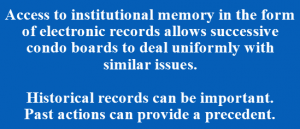 August 2021
August 2021
Condo boards come and go. Directors join and leave the board, with the support of condo owners, creating a fluid system of management.

The best condo boards operate seamlessly regardless of changes in their makeup by utilizing institutional memory. Another way of looking at institutional memory is incorporating all of the experience of past condo boards within a current condo board. These experiences reflect knowing what has been done or attempted in the past so as to make the best decisions for today.

The best condo boards are comprised of experienced and new directors. A stable board will seek to add younger directors as the opportunity arises. These younger board members may lack experience and be more willing to try new things. This balances out with the experience of older directors knowing what has been done or attempted in the past.
At times an entirely new board can take office with no transition where new directors can learn from past directors. This occurs when an entire board chooses to retire from office, or when directors are voted out of office because owners no longer support them. While this can be positive for the community, there tends to be a loss of accumulated wisdom from within the condominium corporation. New directors can waste time and resources reinventing the wheel. They seek to accomplish what has been done before or fail to understand why their approach is unlikely to succeed.
New directors may fail to realize they are now in control of an organization that has been operating for a long time. There were many boards and directors before them. They established budgets, worked with vendors and supported owners. They had successes and failures. An entirely new board loses this institutional memory. Unless efforts are taken to retain institutional memory the new condo board will waste time and resources, and make poor decisions, as they reinvent the learning curve.
Effective condo boards make every effort to retain their institutional memory.
Build and Maintain your Institutional Memory
Keep good records. Maintain meeting minutes, bank statements, bills and vendor contracts in an organized and accessible manner. Ensure future boards can access and understand this information.
- Retain e-mail correspondence. Organize information by topic in a searchable system.
- When rules, by-laws or declaration are changed retain notes on why this was done. Retain legal rulings and notes relating to court proceedings, mediation and arbitration.
- Keep records of what has worked and not worked.
- Retain communications to residents for possible redistribution.
- When disputes occur between the Condominium Corporation and residents maintain records of the dispute, how it was handled and what decisions were made. Were dispute resolution procedures necessary? Were they followed? What could be done to avoid a similar dispute in the future?
Using your Institutional Memory
 When records are maintained and stored correctly they can assist with answering all types of questions. Documents, notes, contracts and other records stored electronically are easily accessed by keyword or topic. If a prior board encountered and dealt with a specific matter it is simple to determine what they did or didn’t do and the ultimate result.
When records are maintained and stored correctly they can assist with answering all types of questions. Documents, notes, contracts and other records stored electronically are easily accessed by keyword or topic. If a prior board encountered and dealt with a specific matter it is simple to determine what they did or didn’t do and the ultimate result.
Certain matters come up every few years. Communications may periodically be repeated to remind some and inform newer residents. When the same question comes up repeatedly from different residents a standard response is quicker. It offers consistency and clarity to all owners and is less likely to cause any misunderstanding.
Access to institutional memory in the form of electronic records allows successive condo boards to deal uniformly with similar issues. Should the current board’s handling of a situation be disputed historical records can be important. Past actions can provide a precedent for justifying current actions or enforcement of governing documents.
Cautions
Following an effective past practice, or precedent, differs from refusing to change because “this is how we have always done it”. Policies should regularly be reviewed to ensure they keep up with the times and continue to make sense.
Institutional memory should not be used to avoid adopting new ideas. Arguing that past practice is always correct, or claiming past practice doesn’t matter, are indications of a board or individuals failing to give proper consideration to issues of importance.
Condo directors are expected to make decisions encompassing areas where they lack expertise. Having access to the condominium corporation’s institutional memory, its comprehensive and searchable electronic records on past matters, helps ensure their decisions are reasoned, fair and consistent.








